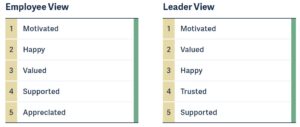Leaders play a critical role in how employees feel at work. The combined results across hundreds of scientific studies has shown that a positive leadership style, and a constructive relationship between leaders and individual team members, are associated with greater feelings of trust, engagement, commitment, and psychological safety. Conversely, toxic or hostile leadership behaviours can have the opposing effect – eroding job satisfaction and well-being.
Why feelings matter
How employees feel is an important issue for organisations. When employees are engaged and committed, they are more likely to be productive, proactive, and stay in the organisation. This is potentially even more critical than ever right now, due to growing concerns about the ‘Great Resignation’, with one recent survey revealing that almost a quarter of UK workers indicated they were planning to move jobs within the next six months.When employees are engaged and committed, they are more likely to be productive and proactive.So, how do people need to feel to perform at their best, and do leaders recognise what people need? Furthermore, how can leaders enable people to feel optimal at work more often?
Findings from an international research study
We explored these key questions recently as part of a new international research study on leadership in the future world of work. To compare perspectives, we asked over 1,000 employees and over 800 leaders across a variety of industries and regions. Each person indicated five feelings of their own choosing that were most important for employees to perform at their best. We then analysed the data to identify the most commonly used words. Here are the top five from both groups in rank order of popularity:
 One thing that is striking from these results is that four out of the top five feelings listed are the same for both employees and leaders, despite it being a free-response question.
Overall, it appears leaders do recognise how people need to feel to reach top performance. According to our research however, 4 out of 10 employees were not reporting a good employee experience in their workplace, indicating some clear room for improvement.
None of the top five feelings provided by employees are necessarily that surprising. Nevertheless, they provide a simple but powerful reminder to leaders about the climate they should be trying to create for their teams.
One thing that is striking from these results is that four out of the top five feelings listed are the same for both employees and leaders, despite it being a free-response question.
Overall, it appears leaders do recognise how people need to feel to reach top performance. According to our research however, 4 out of 10 employees were not reporting a good employee experience in their workplace, indicating some clear room for improvement.
None of the top five feelings provided by employees are necessarily that surprising. Nevertheless, they provide a simple but powerful reminder to leaders about the climate they should be trying to create for their teams.
4 out of 10 employees were not reporting a good employee experience in their workplace.Getting the climate right means that employees should feel engaged (motivated and valued), a sense of positive well-being (happy) and satisfied with their job (supported and appreciated). So, what do leaders need to do to create and maintain a more positive climate?
Emotionally intelligent leadership
First, it is important to recognise that a leader’s own emotions are contagious. How a leader shows up in their day-to-day work has a direct impact on how their team members feel. These moments really matter. What emotions are you showing to your team? How does it feel to work for you? Are you aware of the impact they are having on others? To support this, it can be particularly valuable for leaders to solicit feedback from their team and other colleagues (either verbally or through anonymous surveys) to gain insight into how they come across to others and the tone they set at work.Research indicates that leaders who are emotionally intelligent are more likely to have satisfied employees.Research indicates that leaders who are emotionally intelligent are more likely to have satisfied employees. This means it is important for leaders to pay close attention to their own emotions, along with how their team members are feeling, and then consciously manage their own behaviour accordingly. When leaders are under extreme pressure due to workload, time, and results, this is when they need to be particularly careful about managing their own reactions and emotions.
How leaders can set the right tone
Leaders should think carefully about how they can foster these positive feelings within their teams through their own actions, and provide the right conditions for people to perform. Here are some simple questions that leaders can use to reflect on their own behaviour:-
Motivated
- Are you providing employees with a clear purpose that engages and excites them?
- Can they see how their work impacts on the wider success of the organisation?
- Do they have challenging but realistic goals to strive for?
-
Happy
- Do your employees feel they are performing meaningful work?
- Is their workload manageable, or are they under constant or overwhelming stress?
- Do you encourage them to focus on the positives?
-
Valued
- Do your team members each feel valued for who they are as a person and the strengths they bring to their work?
- Do they feel you genuinely care about their personal views and ideas?
- Do you invest time and thought in finding suitable development opportunities for individuals?
-
Supported
- Are you readily available when your team needs help and support?
- Do they feel you take their concerns on board fully and act on them?
- Do you actively help to overcome challenges and remove barriers to their success?
-
Appreciated
- Do you make a point of thanking people for their input?
- Do you give people specific feedback about what they have done well?
- Do you publicly recognise individuals when they have excelled?











